Sabiha Sumar is a Pakistani filmmaker and producer. She is best known for her independent documentary films. Her first feature-length film was Khamosh Pani , released in 2003. She is known for exploring themes of gender, religion, patriarchy and fundamentalism in Pakistan.

Konkona Sen Sharma is an Indian actress, writer, and director who works primarily in Hindi and Bengali films. She has received two National Film Awards and four Filmfare Awards. The daughter of filmmaker–actress Aparna Sen, Sen Sharma appears primarily in arthouse independent films, and her achievements in the genre have established her as one of the leading actresses of contemporary parallel cinema. She has also acted in mainstream films like Laaga Chunari Mein Daag for which too she has received awards.

Khamosh Pani is a 2003 Indo-Pakistani film about a widowed mother and her young son living in a Punjabi village as it undergoes radical changes during the late 1970s.

Anurag Kashyap is an Indian filmmaker and actor known for his works in Hindi cinema. He is the recipient of several accolades, including four Filmfare Awards. For his contributions to film, the Government of France awarded him the Ordre des Arts et des Lettres in 2013.

Kalki Koechlin is a French actress and writer who works in Hindi films. Known for her unconventional body of work, she is the recipient of such accolades as a National Film Award, a Filmfare Award, and two Screen Awards. Although a French citizen, she has been brought up and lived most of her life in India.
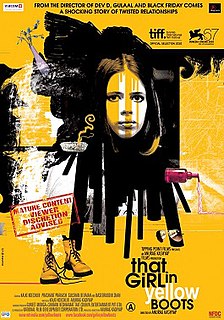
That Girl in Yellow Boots is a 2010 Indian Hindi-language thriller film by director Anurag Kashyap, starring Kalki Koechlin and Naseeruddin Shah. The film was first screened at the Toronto International Film Festival in September 2010, followed by the Venice Film Festival after it played in several festivals worldwide including the South Asian International Film Festival. The commercial release however took place a year later in September 2011, both in India as well as in the U.S.
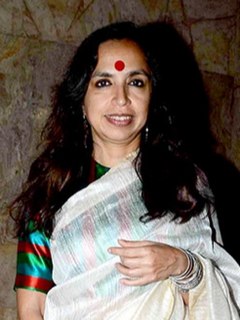
Shonali Bose is an Indian film director, writer and film producer. Having made her feature film debut in 2005, she has since won such accolades as a National Film Award, a Bridgestone Narrative Award, and a Sundance Mahindra Global Filmmaker Award.

My Friend Pinto is a 2011 Indian Hindi-language musical comedy film written and directed by Raaghav Dar, in his feature-length directorial debut. It stars Prateik Babbar as Michael Pinto, a well intentioned simpleton and follows his misadventures over the course of a New Year's Eve in Mumbai. Produced by Sanjay Leela Bhansali and Ronnie Screwvala, and distributed by UTV Motion Pictures, it has elements of picaresque, slapstick comedy and multiple musical sequences. The film features Kalki Koechlin, Arjun Mathur, Shruti Seth, Makarand Deshpande, Rajendranath Zutshi and Divya Dutta in supporting roles.

Gulshan Devaiah is an Indian actor who appears primarily in Hindi films. Devaiah is mostly known for his roles in Shaitan, Hate Story and Hunterrr. His performance in Shaitan was critically praised and earned him a nomination for Filmfare Award for Best Male Debut.

Margarita with a Straw is a 2014 Indian Hindi-language drama film directed by Shonali Bose. It stars Kalki Koechlin as an Indian teenager with cerebral palsy who relocates to America for her undergraduate education and comes of age following her complex relationship with a blind girl, played by Sayani Gupta. Revathi, Kuljeet Singh, and William Moseley play supporting roles. Produced by Bose in partnership with Viacom18 Motion Pictures, Margarita with a Straw was co-written by Bose and Nilesh Maniyar. The film deals with the challenging concepts of sexuality, inclusion, self-love, and self-acceptance.

Good Morning Karachi is a 2013 Pakistani drama film directed by Sabiha Sumar and produced by Sachithanandam Sathananthan under the banner Vidhi Films. The film is written by Malia Scotch Marmo, Sumar and Samhita Arni, based on the novel Rafina by the acclaimed Pakistani writer Shandana Minhas.

Waiting is a 2015 Indian Hindi-language drama film directed by Anu Menon. Produced by Priti Gupta and Manish Mundra under the banner of Ishka Films and Drishyam Films respectively, the film was co-written by Menon and James Ruzicka, and stars Naseeruddin Shah and Kalki Koechlin. Waiting focuses on the relationship between two people from different walks of life who befriend each other in a hospital, while nursing their respective comatose spouses. Rajat Kapoor, Suhasini Maniratnam, Arjun Mathur, Ratnabali Bhattacharjee and Rajeev Ravindranathan play supporting roles in the film.

Kalki Subramaniam is a transgender rights activist, artist, actress, writer, inspirational speaker and entrepreneur from Tamil Nadu.
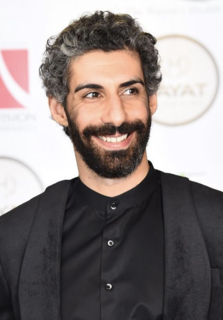
Jim Sarbh is an Indian film and stage actor. Best known for his supporting work in the Hindi films, he is the recipient of a Screen Award, an International Indian Film Academy Award and two Filmfare Award nominations. Additionally, Sarbh has directed and acted in numerous theatre productions in India.
Living Room or The Living Room, is a 2015 Indian play written and directed by actress and playwright Kalki Koechlin, which premiered at Ranga Shankara Hall, Bangalore, in July 2015. The play that marked the directorial debut of Koechlin, stars Neil Bhoopalam and Sheeba Chaddha in lead roles with Jim Sarbh and Tariq Vasudeva playing supporting roles. The play opened to positive response from critics.

Vidhi Kasliwal is an Indian film director and producer, who is the founder and CEO of Landmarc Films.
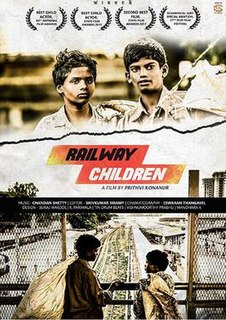
Railway Children is a 2016 Indian Kannada feature film written and directed by Prithvi Konanur. It is inspired from Rescuing Railway Children written by Lalitha Iyer and Malcolm Harper that describes the lives of children that run away from their homes, live in railway stations and trains, and grow up as criminals, despite their intentions being harmless and seeking only to earn a living.
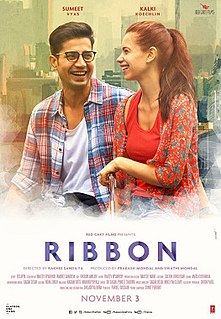
Ribbon is a 2017 Indian Hindi-language drama film directed by Rakhee Sandilya in her feature film debut. It stars Kalki Koechlin and Sumeet Vyas in lead roles. The film was released on 3 November 2017.

Evening Shadows is a 2018 Indian Hindi-language drama film directed by Sridhar Rangayan. The film stars Mona Ambegaonkar, Ananth Narayan Mahadevan, Devansh Doshi, Arpit Chaudhary, Yamini Singh, Abhay Kulkarni, Veena Nair, Kala Ramnathan, Disha Thakur, Sushant Divgikar and Faredoon Bhujwala.


















